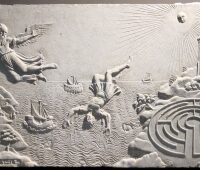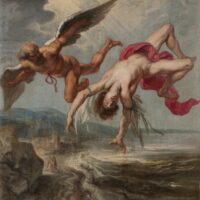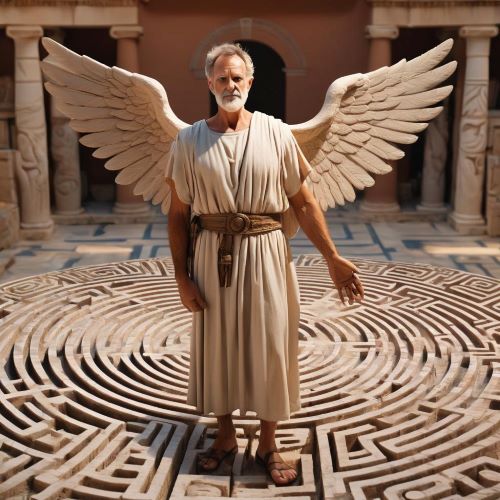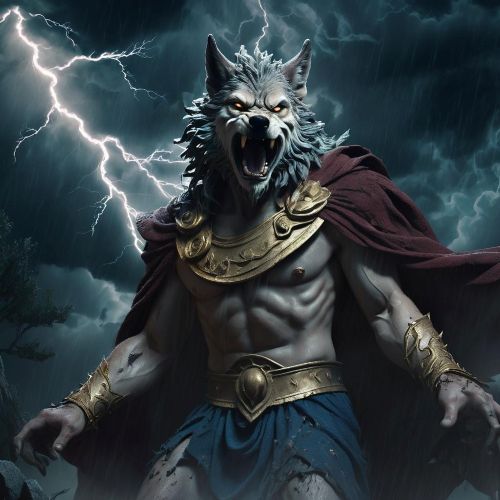Icarus : The Tragic Fugitive
Listen
At a glance
| Description | |
|---|---|
| Origin | Greek Mythology |
| Classification | Mortals |
| Family Members | Daedalus (Father) |
| Region | Greece |
| Associated With | Escape, Flying |
Aigamuxa
Introduction
The myth of Icarus is one of the most enduring and symbolic tales in Greek mythology. Unlike the grand heroes who battled monsters or ruled kingdoms, Icarus’s story is quieter, more intimate—and ultimately tragic. It is a tale that captures the tension between youthful ambition and the wisdom of restraint. Born the son of the ingenious Daedalus, Icarus’s defining moment comes not from conquest, but from flight—an act of liberation that turns fatal when he defies his father’s warning. His rise and fall have been reinterpreted endlessly in literature, psychology, and the arts as a metaphor for the dangers of overconfidence and the cost of aiming too high without understanding the consequences.
Physical Traits
Classical texts don’t spend much time describing Icarus’s physical appearance, but over centuries, artists and storytellers have imagined him as the embodiment of youth and vitality. He’s usually portrayed as a slender, youthful boy—barefoot, with tousled hair, often mid-leap into the sky. His defining visual feature is the pair of wings strapped to his arms, crafted from feathers and wax. These wings, a product of human brilliance and fragility, serve as an extension of his spirit: full of promise, yet vulnerable to collapse.
Family
Icarus’s lineage ties him directly to one of the most revered minds in Greek mythology—his father, Daedalus. A master inventor, Daedalus designed the infamous Labyrinth on Crete and possessed a mind capable of transforming imagination into reality. While many myths focus on Daedalus’s genius, Icarus’s story adds an emotional layer to his father’s legacy. The bond between them becomes the emotional core of the myth: a father invents a way to free his son, but also imposes limitations. When those limits are ignored, the result is heartbreak. Icarus’s fall isn’t just a lesson in hubris—it’s also a father’s worst fear realized.
Other names
Although Icarus is primarily known by this singular name, ancient Greek sources spell it as Íkaros (Ἴκαρος). Unlike gods or major heroes who often have several epithets, Icarus’s name itself has come to symbolize his fate. Over time, literature and psychology have granted him metaphorical titles like “The Boy Who Flew Too Close to the Sun” or “The Fallen Dreamer.” These symbolic phrases are more than nicknames—they encapsulate his myth and how it’s been absorbed into cultural consciousness.
Powers and Abilities
Icarus had no powers of his own. He wasn’t a demigod, warrior, or magician. What set him apart was the tool given to him—wings of feather and wax, handcrafted by Daedalus. These wings, bound to his back by ingenuity and caution, allowed him a taste of godlike freedom: flight. With this flight came symbolic abilities—an elevation of the mortal condition, the gift of escape, and the thrill of transcendence. But his downfall was also built into this gift. The very technology that lifted him up was subject to nature’s laws. When he soared too high, the sun’s heat melted the wax, and gravity reclaimed him. His only true “power” was his choice—how he used what he was given.
Modern Day Influence
The story of Icarus continues to resonate in modern thought, often serving as a timeless warning about the dangers of unchecked ambition. In psychology, the term “Icarus Complex” is used to describe individuals driven by an insatiable desire for greatness, frequently resulting in their own downfall. His tale has been adopted across disciplines to emphasize the value of humility, restraint, and learning from guidance. In fields like leadership, education, and innovation, Icarus serves as a powerful symbol of the risks associated with pushing boundaries too far—especially without foresight. His myth prompts ongoing conversations about technology, ambition, and the cost of ignoring limits in the pursuit of glory.
Culturally, Icarus’s name has transcended mythology to become a metaphor for overreach in music, theater, film, and politics. Artists, thinkers, and commentators often invoke his story when examining the downfall of public figures, failed ventures, or societal missteps. Whether it’s a startup collapsing under its own hype or a celebrity spiraling after peaking too soon, the figure of Icarus hovers as a cautionary reminder. His moral legacy remains adaptable—used to critique recklessness or to romanticize the pursuit of greatness, even when it ends in ruin.
In the visual and literary arts, Icarus has remained a constant source of inspiration. Pieter Bruegel the Elder’s painting Landscape with the Fall of Icarus portrays the indifference of the world to individual tragedy—a theme echoed across time. Roman reliefs, Renaissance paintings, and contemporary installations continue to capture the pathos of his descent. In literature, Ovid’s Metamorphoses presents the foundational version of the tale, while W.H. Auden, James Joyce, and others have reinterpreted it to explore ambition, rebellion, and human vulnerability. Today, Icarus appears in novels, poetry, and children’s books alike, his story still serving as a metaphor for the fragile balance between dream and downfall.
Related Images
Source
carus. (n.d.). Greek Mythology Wiki. Retrieved from https://greekmythology.fandom.com/wiki/Icarus
Icarus. (n.d.). Myth and Folklore Wiki. Retrieved from https://mythologymyth.fandom.com/wiki/Icarus
Icarus. (n.d.). Wikipedia. Retrieved from https://en.wikipedia.org/wiki/Icarus
Icarus – The Tragic Story of Icarus. (n.d.). Greek Gods and Goddesses. Retrieved from https://greekgodsandgoddesses.net/myths/icarus/
Icarus and Daedalus in Greek Mythology – A Fascinating Tale. (n.d.). Greek Mythology Tours. Retrieved from https://www.greekmythologytours.com/icarus-and-daedalus-in-greek-mythology-a-fascinating-tale/
Icarus in Greek Mythology. (n.d.). GreekEdu. Retrieved from https://greekedu.org/icarus-in-greek-mythology/
Icarus in Greek Mythology. (n.d.). Greek Legends and Myths. Retrieved from https://www.greeklegendsandmyths.com/icarus.html
Icarus in Greek Mythology: The Tragic Tale Of Daedalus’ Son. (n.d.). Mystery in History. Retrieved from https://mysteryinhistory.com/icarus-in-greek-mythology-the-tragic-tale-of-daedalus-son/
Buxton, R. (2005). The Complete World of Greek Mythology. Thames & Hudson.
Graf, F. (1993). Greek Mythology: An Introduction. Johns Hopkins University Press.
Frequently Asked Questions
What is lorem Ipsum?
I am text block. Click edit button to change this text. Lorem ipsum dolor sit amet, consectetur adipiscing elit. Ut elit tellus, luctus nec ullamcorper mattis, pulvinar dapibus leo.
What is lorem Ipsum?
I am text block. Click edit button to change this text. Lorem ipsum dolor sit amet, consectetur adipiscing elit. Ut elit tellus, luctus nec ullamcorper mattis, pulvinar dapibus leo.
What is lorem Ipsum?
I am text block. Click edit button to change this text. Lorem ipsum dolor sit amet, consectetur adipiscing elit. Ut elit tellus, luctus nec ullamcorper mattis, pulvinar dapibus leo.
What is lorem Ipsum?
I am text block. Click edit button to change this text. Lorem ipsum dolor sit amet, consectetur adipiscing elit. Ut elit tellus, luctus nec ullamcorper mattis, pulvinar dapibus leo.
What is lorem Ipsum?
I am text block. Click edit button to change this text. Lorem ipsum dolor sit amet, consectetur adipiscing elit. Ut elit tellus, luctus nec ullamcorper mattis, pulvinar dapibus leo.














